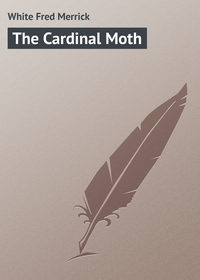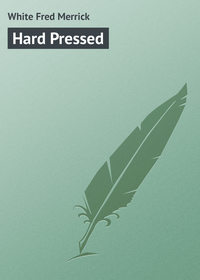 полная версия
полная версияThe Slave of Silence
CHAPTER XXIV
Every word of the conversation was quite plain and distinct. Richford seemed to be very vexed about something, but on the other hand Sartoris appeared to be on the best of terms with himself.
"You tried to get the better of us," he was saying. "You thought that clever people like ourselves were going to be mere puppets in the play, that we were going to pull your chestnuts for you. You with the brains of a rabbit, and the intelligence of a tom cat! That low cunning of yours is all very well in the City, but it is of no use with me. Where are those diamonds?"
"Those diamonds are so safe that we can't touch them," Richford sneered.
"Very well, my friend. Believe me, we shall know how to act when the time comes. But you are wasting time here. You should be in Edward Street long ago. Edward Street in the Borough; you know the place I mean. The others are there, Reggie and Cora and the rest, to say nothing of the object of our solicitous desires. You follow me?"
"Oh, yes, I follow everything, confound you," Richford growled. "You are trying to frighten me with your cry of danger. As if I was fool enough to believe that story."
"You can just please yourself whether you believe it or not," Sartoris replied. "But the danger is real enough. I have had the salt two days now in succession. It is true that it came by post and was not addressed to me here, but it is proof positive of the fact that our yellow friends are on the right track at last. They may even be outside now. That is why I want you to go as far as Edward Street without delay."
Richford seemed to be convinced at last, for he made no reply.
"And you need not worry about your wife for the present," Sartoris went on. "So long as she is your wife you come in for your share of the plunder when the division takes place. Nor need you let her know that you married her for her fortune, and not for her pretty face. People will be surprised to discover what a rich man Sir Charles really was."
Berrington started with surprise. A great flood of light had been let in on the scene in the last few words of this overheard conversation. So there was a large fortune somewhere, and this was at the bottom of this dark conspiracy. The conversation trailed off presently, and Berrington heard no more. But his heart was beating now with fierce exultation, for he had heard enough. Without knowing it, Sir Charles Darryll had been a rich man. But those miscreants knew it, and that was the reason why they were working in this strange way. A door closed somewhere and then there was silence. It was quite evident that Richford had left the house.
A minute or two later and Berrington got his flash signal at work. He used it over and over again for an hour or so in the hope that the house was being watched. A great sigh of satisfaction broke from him presently when he knew the signal was being answered. Once more there was an irritating delay and then the quick tapping of the reply. Field was not far off, and Field had grasped the scheme. Also he had to send for somebody to translate the flashing signs. Berrington understood it now as well as if he had been outside with the police.
He sent his messages through quickly now, and received his replies as regularly. Nor did he forget to impart the information he had discovered relative to the house in Edward Street, Borough. On the whole it had not been a bad night's work.
A restless desire to be up and doing something gripped Berrington. He wandered impatiently about the room, listening at the tube from time to time, in the hope of getting something fresh. Down below he could hear the sharp purring of the electric bell and the shuffle of Sartoris's chair over the floor of the hall. Then there was a quick cry which stopped with startling suddenness, as if a hand had gripped the throat of somebody who called out with fear.
For a little time after that, silence. Then voices began to boom downstairs, voices in strange accents that seemed to be demanding something. Evidently foreigners of some kind, Berrington thought, as he strained his ears to catch something definite. Sartoris seemed to be pleading for somebody, and the others were stern and determined. It was some time before Berrington began to understand what nationality the newcomers were. A liquid voice was upraised.
"Burmah," Berrington cried. "I thought I knew the tongue. Burmese beyond a doubt. I wish those fellows would not speak quite so quickly. I wish that I had learned a little more of the language when I had the opportunity. Ah, what was that?"
A familiar phrase had struck home to the old campaigner. One of the newcomers was saying something about rubies. There were ruby mines in Burmah, some of which had never been explored by white men. Sir Charles Darryll had been out there in his younger days and so had his friend, the Honourable Edward Decié. Suppose that rubies had something to do with the papers that Sartoris declared Sir Charles possessed. Berrington was feeling now that his weary hours of imprisonment had by no means been wasted. He heard Sartoris's sullen negative, a sound of a blow, and a moan of pain, then silence again.
Perhaps those strangers downstairs were applying torture. Berrington had heard blood-curdling stories of what the Burmese could do in that way. Bad as he was, Sartoris had never lacked pluck and courage, and he was not the man to cry out unless the pain was past endurance. The guttural language returned; it was quite evident that Sartoris was being forced to do something against his will.
"You shall have it," he said at last. "I'll ask my secretary to bring the papers down."
There was a shuffling of Sartoris's chair across the floor, and then a puff of wind came up the tube. Very quickly Berrington replaced the whistle. It flashed across him that Sartoris was going to call him to assist to get rid of those yellow friends downstairs. But how was that going to be done so long as the door was locked?
"Are you there?" Sartoris asked in French, and in a whisper, so low that Berrington could hardly hear. "Speak to me, Colonel, and use the same language that I am using."
"All right," Berrington replied. "Anything wrong downstairs? What can I do to help you?"
"Come down as quickly as possible. Take your boots off, and creep into my study. I am in the hands of two Burmese, members of a society to which I belonged at one time. They have come to have my life or certain information that I decline to give them. You know enough of the East to be able to appreciate my danger."
The story was more or less of a lie, as Berrington was perfectly well aware, but there was a large amount of truth in it, nevertheless. Berrington smiled to himself.
"There is one little hitch in the programme," he said. "You seem to forget that I am a prisoner here, behind a door that is protected by steel."
"I had forgotten that for the moment," Sartoris proceeded rapidly. "But it is quite possible to open the door from the inside, if you know the secret. Turn the handle four times to the right quickly and firmly, and then three times to the left, and the door will open. I dare not say any more, as these fellows are beginning to look at me suspiciously. One minute more, and I have finished. There is an old Dutch bureau at the top of the stairs by your door. In the second drawer on the right is a loaded revolver. You may want to use it – "
The voice suddenly ceased, and a cry of pain floated up again. All the old fighting spirit raged in Berrington's veins now. He was going to be free, he would have a weapon that he well knew how to use in his hands, and he had obtained information of the most valuable kind. With his hand on the knob of the door he followed directions. Four times to the right and three to the left! A pull, and the door came open.
Berrington was free at last. As soon as he realised that fact his professional caution came back to him. He kicked off his boots, and finding the Webley revolver, loaded in all chambers, he crept like a cat down the stairs, and looked into the study.
Sartoris lay back in his chair with his hands bound to his sides. Round his head the two strangers had strung a piece of knotted whipcord which one of them was drawing tighter and tighter with the aid of a penknife twisted in the bandage. The face of the victim was ghastly white, his eyes rolled, and the great beads poured down his cheeks. Berrington had heard of that kind of torture before. His blood was boiling now, not that he had any cause for sympathy with the little man in the chair.
"My God, I can't stand this much longer," Sartoris moaned. "Will that fellow never come! Or has he failed to understand my instructions? My brain is blazing. Help, help."
Berrington strode into the room, resolutely but softly. The little yellow man who was administering the torture seemed to have his whole heart in his work; he graduated the torture to a nicety. He seemed to understand exactly how much the victim could stand without losing life and reason altogether. He was like a doctor with an interesting patient.
"I think you will tell me where to find what we desire?" he said smoothly.
"And then we can depart and trouble the gentleman no more," said the other man, who was looking on as coolly as if at some landscape. "Why put us to all this trouble?"
"I'll tell you," Sartoris moaned. "If you will look in the – God be praised!"
The last words came with a yell, for the startled eyes had caught sight of Berrington standing grimly in the background. The latter's left hand shot out and the Burmese who held the penknife in the cord staggered across the room from the force of a blow on the temple, which, had it taken full effect, would have felled him like an ox.
Before he could recover from the full impact of the blow, Berrington was on the other man. Then the two closed on him as he backed to the wall and raised his revolver.
"You see that I am too many for you," he said. "Put down those knives."
For two long cutting knives were gleaming in the light of the electrics. Nothing daunted, the pair made a rush at Berrington, who fired right and left. He had no intention that the shots should be fatal, but they both took effect, one in the shoulder and the other in the arm. When the smoke cleared away Berrington and Sartoris were alone. A cold stream of air pouring into the room testified to the fact that the front door had not been closed by the miscreants in their escape. Berrington cut the cord around the victim's head and bathed his forehead with water. A little brandy seemed to effect something in the way of a cure.
"My God, that was awful, awful," Sartoris moaned. "A second more and I should have died. Would you mind shutting the front door? The cold air makes me feel like death. That's better. I dare say you wonder what those fellows were doing here?"
There was just a touch of slyness in the question. Berrington smiled to himself. He wondered what Sartoris would say if he only knew how much the listener had overheard.
"I suppose your sins are finding you out," he said. "They generally do. Personally, I have no curiosity on the subject at all. And I have not the slightest doubt that your punishment, though pretty severe, was at the same time well deserved. And now, sir, as fate has given me the whip hand of you, have you any reason to urge why I should stay in this house any longer? I take it that you are not quite in a position to place your electric battery at work from this room as you did from the other. If you like to – "
Berrington paused, as there was a loud knocking at the door. Sartoris's pale face grew still paler as he listened. Then he forced a smile to his pallid lips.
"Don't take any heed," he said eagerly. "Let them go away again under the impression that nobody is at the house. Let them knock all night if they like."
But Berrington was already half-way to the door.
CHAPTER XXV
With the letter to Beatrice safe in her pocket, Mary made her way to the Royal Palace Hotel. She had her own idea as to what she was going to do, and that certainly was not to invite Beatrice to go to Wandsworth. For the girl had a difficult and dangerous task before her. Rightly or wrongly, it seemed to her that her place was by the side of the brother who had treated her so badly. Many a good woman before had sacrificed herself to a scoundrel, and many a good woman will do so again. Mary had always clung to the idea that Sartoris might be brought back to the fold again. She knew pretty well how far he had fallen, but she did not quite understand the deep depravity of the man's nature. After all, he was an object to be pitied; after all, he had been the victim of a woman's cruelty, or so Mary thought. But Mary did not know everything; had she done so she would have been forced to leave her brother to his own devices.
She came at length to the Royal Palace Hotel, and asked for Beatrice. The latter was in her room, she was told, and Mary went up. But Beatrice was not there, her place for the time being occupied by Adeline, the maid.
"My mistress is out," the maid explained; "but if you will leave any message I can deliver it. She will not be very long, in any case."
Mary hesitated. She had many things to do and no time to waste. It was not altogether imperative that she should see Beatrice just at the moment. She turned the matter over in her mind before she replied to Adeline's suggestion.
"I rather wanted to see your mistress," she said. "Perhaps I may make it convenient to return in about half an hour or so. Meanwhile, will you please give her this letter. Will you be very careful to say that Mrs. Richford is to do nothing till she has seen me? I mean that she is not to take any steps in the matter of the letter till I come back. Will you be especially careful about that?"
Adeline promised, in a vague kind of way. She did not express the usual curiosity of her class; her mind seemed to be elsewhere. She showed Mary out with an alacrity that would have aroused her suspicions had she had less to occupy her mind. But Adeline had affairs of her own to think of. There was a very striking-looking valet on the same floor who had shown himself not insensible to the girl's attractions. Adeline laid the note on the table and promptly forgot all about it.
In the full assurance that no harm was possible for the present, Mary went her way. It was getting late in the evening now, and the hotel was full of people; a strange excitement seemed to be in the air; outside, the newsboys were particularly busy, and there seemed to be a more than usually heavy run on their wares.
Surely they were shouting a familiar name, Mary thought. She came out of her brown study and listened. It was something to do with Stephen Richford. Surely there could not be two men of the same name. No; it must be the same.
"Startling disclosures in the City. Collapse of a great firm. Richford & Co. go down. Warrant out for the arrest of the senior partner. Flight of Stephen Richford."
Mary listened in amazement. Her brother knew a great deal about this man; he had always been spoken of as a wealthy individual. And here was Beatrice Darryll's husband a criminal and a fugitive from justice. Nobody appeared to be talking about anything else; the name was on the streets. Mary could hear it everywhere. A bent man, with a clerical hat and glasses and an Inverness cape, hurried by the girl as she came out of the hotel. Even this elderly gentleman seemed interested.
He pushed his way into the hotel and feebly ascended the stairs as if he had business there. In so large a place every respectably dressed man could pass in and out without incurring suspicion. No hall porter would stop any visitor and ask his business, so that the elderly clergyman passed unchallenged. As he came to the door of Beatrice's room he hesitated for a moment, and then passed in and closed the door behind him.
"Nobody here!" he muttered. "Maid gone off on her own business, I suppose. Well, I can sit down here and wait till Beatrice comes back. What's this? A letter addressed by some unknown correspondent to Mrs. Richford. By Jove! Sartoris's address on the flap. Now, what does this little game mean? And who wrote the letter? My dear Sartoris, if I only had you here for the next five minutes!"
The man's face suddenly convulsed with rage, his fists were clenched passionately. He paced up and down the room with the letter in his hand.
"This may tell me something," he said; "this may be a clue. I'll open it."
As frequently happens with thick envelopes, the gum was defective, and the back of a penknife served to open the cover without in any way betraying the fact that the cover had been tampered with. A puzzled frown crossed the face of the thief.
"Berrington!" he muttered; "Berrington! Oh, I know. That beast, eh? Now considering that he is more or less of a prisoner in the house of my dear friend Sartoris, why does he write like this to Beatrice? Damn Sartoris; there is no getting to the bottom of him, with his wily brain. On the whole Beatrice shall be allowed to go. It's a horrible position for a girl like her; but at the present moment I have no choice – perhaps I'll join the party later on. Hang those newsboys, too – why can't they stop their silly clatter?"
The intruder replaced the letter, and a moment later Beatrice came in. She started at the sight of the stranger, who made some apology for the intrusion. The man looked old and respectable and harmless, so that the girl smiled at him. But she did not smile when the shovel hat was removed, together with the wig and the glasses.
"Stephen!" Beatrice gasped. "What is the meaning of this?"
"Well, I can conclude that my disguise is a pretty good one," Richford grinned, "seeing that you did not recognize me at all. And as to what this means, I should say that your own common sense would tell you. Did you hear anything?"
"I heard the boys with the papers," Beatrice said; "but I did not connect … do you mean to say that you are, you are – "
Beatrice could not say the word. But there was no reason for her to ask the question.
"Why be so delicate about it in the presence of a mere husband?" Richford sneered. "Do you suppose I came here in disguise just to give you a pleasant surprise? The bubble has been pricked, and all the rest of it. I went for too much, and I failed, as many a better man has failed before me. I have Carl Sartoris to thank for this; I should have pulled through but for him. This is his revenge because I would not do as he desired. Whatever you do, beware of that man! Don't go near him under any circumstances."
"I am not likely to go near him," Beatrice said coldly; "but tell me, why did you come here? It is not possible that I can help you in any way!"
"Oh, yes it is," Richford said, with a certain good humour that caused Beatrice to turn suspicious at once. "You can do a great deal for me if you only will. I am going to leave you a desolate and disconsolate widow. A grass widow, if you like; but you will have your freedom. I am going to leave my country for my country's good; I shall never come back again. But the crash has come at a time when I least expected it, which is a habit that crashes have. I had barely time to procure this disguise before the wolves were after me. They are hot on my track now, and I have no time to spare. What I come for is money."
"Money! Surely you made a sorry mistake then!"
"Oh, no; I'm not asking for cash, seeing that you have practically none of your own. As you refuse to consider yourself my wife, in future you must also decline to take anything from me. Therefore those diamonds are not your property. If you will hand them over to me, we will shake hands and part for ever."
Beatrice drew a long deep breath of something like relief. It was good to know that this man was going to rid her of his hateful presence for ever, but this was too big a price to pay for her freedom.
"Let us quite understand one another," she said. "Your business is ruined; there is nothing left. What about your creditors, the people who trusted you?"
"Burn and blister my creditors," Richford burst out furiously. "What do they matter? Of course the fools who trusted me with their money will cry out. But they only trusted it with me, because they thought that I was slaving and scheming to pay them big dividends. It will not be the welfare of my creditors that keeps me awake at night."
"Always cold and callous and indifferent to the feelings of others," Beatrice said. "Not even one single thought for the poor people that you have ruined. What are those diamonds worth?"
"Well, I gave £40,000 for them. I dare say I can get, say £30,000 for them. But we are wasting time in idle discourse like this."
"Indeed, we are," Beatrice said coldly. "So you think that in the face of what you have just told me, I am going to hand those stones over to you! Nothing of the kind. I shall keep them in trust for your creditors. When the right time comes I shall hand them over to the proper authorities. Nothing will turn me from my decision."
A snarling oath burst from Richford's lips. He stretched out his hand as if he would have fain taken Beatrice by the throat and strangled her.
"Don't fool with me," he said hoarsely; "don't play with me, or I may forget myself. Give me those diamonds if you have any respect for your skin."
But Beatrice made not the slightest attempt to move. Her face had grown very pale, still she was quite resolute.
"If you think to frighten me by threats, you are merely wasting your time," she said coldly. "The stones are in safe keeping, and there they remain till I can give them to your trustees."
"But I am powerless," Richford said. "How am I to get away? In a few hours all my resources will be exhausted, and I shall fall into the hands of the police. And a nice thing that would be. Your husband a felon, with a long term of imprisonment before him!"
"I see no dissimilarity," Beatrice said, "between the deed and the punishment that fits it. After all I have gone through, a little thing like that would make no difference to me."
"Then you are not going to part with those diamonds?"
Beatrice shook her head. Richford stood before her with one of his hands on her arm and his other about her white slender throat. There was a murderous look on his face, but the eyes that Beatrice turned upon him did not for a moment droop. Then Richford pushed the girl away brutally from him and walked as far as the door.
"You don't want for pluck," he growled. "I believe that if you had flinched just now I should have killed you. And I was going to save you from a danger. I shall do nothing of the kind. Go your own way, and I will go mine."
Richford glanced at the letter on the table, then he passed out, banging the door behind him. In the foyer of the hotel he sat down as if waiting for somebody. In reality he was trying to collect his scattered thoughts. But it was hard work in that chattering, laughing mob, with his own name on the lips of a hundred people there.
CHAPTER XXVI
The venerable-looking old cleric sat there for the better part of an hour in the patient attitude of one who waits for a friend, but though he puzzled his cunning brain he could see no way out of the difficulty. He had no money, and the police were after him. He recognised only too well that he had to thank Sartoris for this – he had measured his cunning against that of the little cripple, and he had failed. He had played for the greater part of the stake that was at the bottom of the mystery, and he had paid the penalty. Bitterly he regretted his folly now.
Presently, his humming brain began to clear. He saw one or two people there whom he knew; he saw Beatrice come down to the office and go out presently, with a little flat case under her arm. Richford's eyes gleamed, and a glow of inspiration thrilled him.
"As sure as fate she has the diamonds," he told himself. "She is afraid that I should hit upon some scheme for getting them, and she is going to dispose of them in some hiding-place. I'll follow her. Courage, my boy – the game is not up yet."
As a matter of fact, Richford had summed up the situation correctly. In some vague way Beatrice was a little alarmed. She had heard of such things as injunctions and the like. Suppose the law stepped in to protect the rogue, as the law does sometimes. And Beatrice had something else to do, for she had read Berrington's letter, and she had made up her mind to go to Wandsworth without delay. But first of all she would walk as far as the old family jewellers in Bond Street and deposit the stones there. She had every faith in the head of the firm, whom the family had dealt with for so many years.






